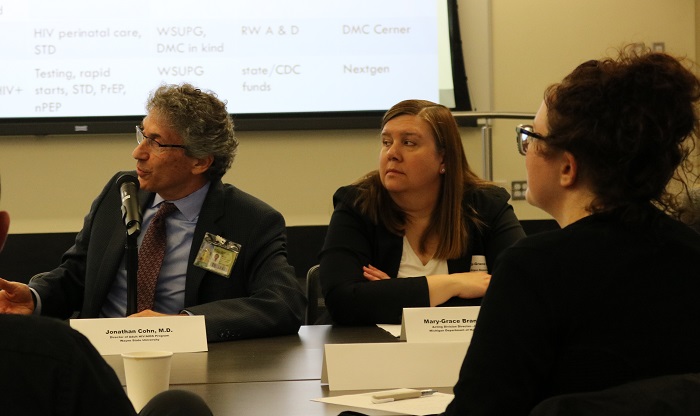National health leaders selected the Wayne State University School of Medicine to unveil new initiatives to fight the virus that claimed more than 6,000 lives a mere three years ago. The visitors are on the front lines of President Donald Trump’s plan announced earlier this year to end the HIV epidemic in the United States by 2030.
The result, “Ending the HIV Epidemic in Detroit: A Discussion with Rear Admiral Sylvia Trent-Adams,” was held May 9 in the School of Medicine’s Margherio Family Conference Center. More than two dozen invited guests were welcomed by WSU President M. Roy Wilson before participating in lively a two-hour discussion and roundtable. Guests included representatives from national, state and local organizations such as the U.S. Department of Health and Human Services, Michigan Department of Health and Human Services, Wayne State University’s Division of Infectious Diseases and the City of Detroit Health Department.

“About two weeks ago, I was contacted by the Chief of Staff of the Office of the Assistant Secretary for Health, saying that they had heard of the great work Wayne State was doing in the HIV space, including through the Ryan White Program,” said Doug Skrzyniarz, WSU’s associate vice president of Government Health Affairs. “In the president’s plan to end the HIV epidemic in the U.S. within 10 years, they are first targeting 50 jurisdictions that bear more than 50 percent of the new HIV diagnoses and this includes Wayne County, so WSU seemed like a good place to land.”
The announced plan includes five goals:
- Diagnose all people with HIV as early as possible after infection
- Treat the infection rapidly and effectively to achieve sustained viral suppression
- Protect people at highest risk of HIV potent evidence-based interventions
- Respond rapidly and effectively to clusters and outbreaks of new HIV infections
- Employ a “boots-on-the-ground” workforce, ensuring implementation.
Trent-Adams is a nurse with a doctorate in public policy and the principal deputy assistant secretary for health in the U.S. Department of Health and Human Services, a position she has held since January. She was previously Deputy Surgeon General of the U.S. Public Health Service Commissioned Corps. Her colleague, Office of HIV/AIDS and Infectious Disease Policy Director Tammy Beckham, also gave a presentation. In addition, representatives from the U.S. Centers for Disease Control and Prevention and the Health Resources and Services Administration were on site.
Steven Young, director of HRSA’s Division of Metropolitan HIV/AIDS Programs, HIV/AIDS Bureau was presented and testimonials from his respective organization. Young has been active in HIV/AIDS legislation and programming since the 1980s. The first HIV cases were reported in the U.S. in 1981.
Anti-retroviral drug therapy has since made the condition livable. But the nation’s new HIV cases are confined to less than 1.6 percent of U.S. counties, along with Washington, D.C. and San Juan, Puerto Rico. Wayne County is one of them.
“This is the right time, and Detroit is the right place to make a difference,” Young said.
Out of 700 to 800 new cases of HIV diagnosed in Michigan annually, one-third are diagnosed in Detroit. Black males who have sex with other males are 325 times more likely to be diagnosed with the virus than the general population.
The Michigan Department of Health and Human Services receives $26.2 million annually in federal funds from the HRSA and the CDC to give to local partners like WSU, who run programs and offer resources that work to end the HIV epidemic across the state, including Wayne County and the City of Detroit. The HRSA also directly funds Ryan White Part A and C entities in southeast Michigan.
The Ryan White Care Act has provided funding to Detroit since 1991, including more than $10 million annually. The funds support a variety of clinics, community outreach and educational programming, including The Horizons Project and the WSU Infectious Diseases Clinic.
WSU community-based HIV activities include testing in Detroit Medical Center and Ascension Health emergency departments; statewide HIV training and education, World AIDS Day Detroit, student initiatives for testing and prevention, and collaborations with HIV care providers such as Corktown Health Clinic.